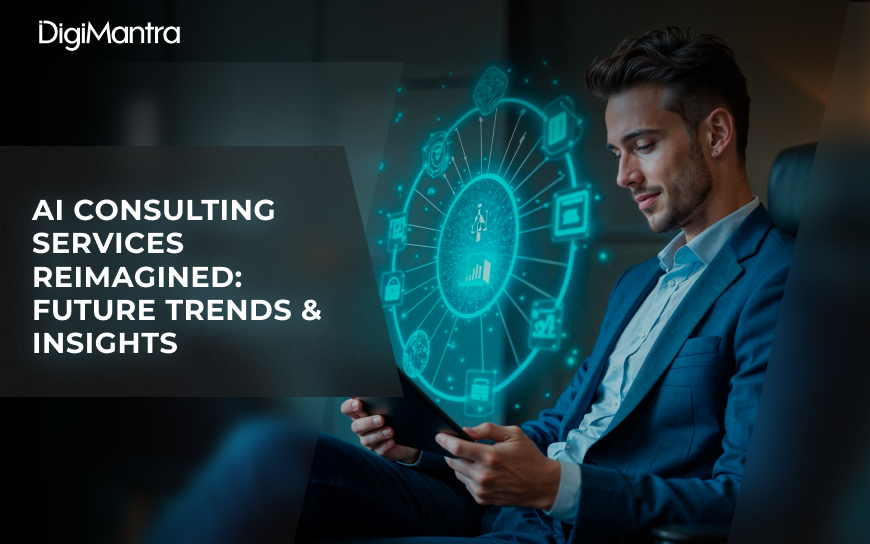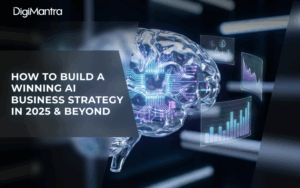Artificial Intelligence is no longer a futuristic concept. It’s the core driver behind business transformation today. Organizations across industries are increasingly turning to AI to automate operations, improve decision-making, and create personalized customer experiences. But while technology itself evolves, the consulting world around it is also undergoing a major shift.
According to recent insights from Future Market Insights (FMI), the global AI consulting market is expected to expand from USD 11.07 billion in 2025 to approximately USD 90.99 billion by 2035, reflecting a strong 26.2% CAGR over the forecast period. The future of AI consulting services is not about offering short-term advice or building isolated models; it’s about long-term collaboration, where strategy, implementation, and human adaptation come together.
Let’s explore how AI consulting services are transforming and what lies ahead for businesses and consultants alike.
1. From Recommendations to Products, Consulting Becomes Software-First
The forthcoming major shift in AI strategy consulting is the move from advice-driven services to product-driven solutions. Traditionally, consulting firms would analyze a client’s data, suggest improvements, and occasionally deliver a proof of concept. The future, however, belongs to consultancies that act like software companies, creating reusable, scalable AI tools that deliver ongoing value.
This change allows consultants to go beyond one-time reports and instead build solutions that clients can continuously rely on. For instance, instead of just recommending fraud prevention strategies, an AI consultancy might now deliver a complete fraud detection engine that clients can integrate directly into their systems. This transition toward productization ensures faster results, higher scalability, and more consistent quality.
To thrive in this new model, AI consulting firms are building product development teams, investing in cloud-native pipelines, and offering AI as a managed service. In short, AI strategy consulting is evolving from theory to tangible, repeatable outcomes.

2. Agentic and Autonomous AI: The Rise of Digital Co-Workers
Another defining trend is the emergence of agentic or autonomous AI, which means systems that can perform tasks independently and make decisions without constant human direction. These AI “co-workers” are already being tested in areas such as IT management, insurance claims, and customer support. They can schedule tasks, process data, and even handle customer interactions based on predefined goals.
However, the rise of these autonomous agents also creates new responsibilities. AI consulting firms will need to help businesses design AI governance models that balance automation with safety and accountability. Clear frameworks for oversight, decision-tracking, and human intervention will become essential.
As digital agents grow more powerful, consultants will guide organizations on how to deploy them responsibly, ensuring that autonomy never compromises control, transparency, or trust.
3. Industrialization of AI with MLOps and ModelOps
Building an AI model is no longer the biggest challenge, but maintaining it efficiently certainly is. As AI systems become integral to business operations, the focus has shifted toward industrialization, i.e., the process of scaling and managing models systematically.
Future AI strategy consulting will center around MLOps and ModelOps practices, ensuring that every model deployed in production remains reliable, cost-effective, and performance-ready. This involves building automated workflows for testing, deployment, monitoring, and retraining. Rather than treating AI as a series of experiments, consultancies will assist organizations in creating infrastructure that supports continuous improvement and rapid scaling.
In essence, consultants will operate less like strategists and more like engineers, embedding AI systems deeply into the client’s business fabric so that innovation never stops.
4. Vertical and Micro-Vertical Expertise for Deep Industry Specialization
Generalized AI solutions are now losing relevance. The next era of artificial intelligence consulting services will favor deep specialization, meaning firms that understand not only technology but also the nuances of specific industries.
Consultants who focus on a particular domain, whether healthcare, banking, retail, or logistics, will deliver greater impact because they understand regulatory constraints, data structures, and operational challenges unique to that sector. The trend doesn’t stop at broad industries; it’s now extending into micro-verticals, such as clinical trial optimization in healthcare or supply chain forecasting in manufacturing.
This industry-first approach reduces learning curves, improves ROI, and fosters innovation that’s grounded in real-world business needs. It’s no longer about building “an AI model,” but about solving a specific, meaningful problem with deep contextual understanding.

5. Responsible AI: Governance, Safety, and Explainability Take Center Stage
As AI systems become more embedded in daily business operations, the stakes have never been higher. A poorly governed AI model can lead to biased outcomes, compliance issues, and reputational damage. This is why AI governance, ethics, and explainability are emerging as critical consulting priorities.
AI consulting firms will increasingly design frameworks that make algorithms transparent, auditable, and aligned with ethical standards. They’ll also help organizations comply with evolving global regulations, such as the EU AI Act or the U.S. AI Bill of Rights. Clients are demanding clarity, and they want to know how AI models make decisions and how those decisions impact users.
In the coming years, responsible AI will shift from being a compliance checkbox to a full-fledged consulting service, integrating legal, ethical, and operational expertise into every AI deployment.
6. Sovereign AI and Hybrid Infrastructure to Keep Data Secure and Local
Data sovereignty is fast becoming a defining issue in AI adoption. As countries enforce stricter localization laws and enterprises grow more protective of their data, the need for sovereign AI solutions is expanding.
AI consulting firms will soon play a pivotal role in designing hybrid architectures that blend cloud scalability with local control. Sensitive data can remain within national or corporate boundaries, while AI models still benefit from global capabilities through secure integrations. This approach ensures compliance, reduces latency, and strengthens trust among clients and users.
AI consultants of the future will therefore need to master secure deployment architectures, multi-cloud governance, and advanced data encryption methods to meet both business and regulatory demands.
7. The Human Side of AI: Change Management and Workforce Transformation
While technology often takes center stage in AI discussions, the human dimension is what truly determines success. AI doesn’t replace people; it rather redefines their roles. The most effective AI consulting strategies will focus not only on implementation but also on workforce transformation.
Consultants will increasingly work with clients to design reskilling programs, redefine job roles, and help employees collaborate effectively with AI tools. The challenge is not about replacing human intelligence but about amplifying it. When employees understand how to work alongside AI systems, then productivity, creativity, and decision-making improve dramatically.
Future AI consulting services will therefore involve equal parts technology and psychology, addressing both machine learning and human learning in parallel.

8. Generative AI Goes Mainstream from Demos to Real Deployments
Generative AI has captured global imagination, from creating text and images to designing software and marketing campaigns. But the next phase of AI strategy consulting will focus on turning these exciting experiments into dependable, scalable business tools.
Generative AI consulting will guide organizations through the practical realities of GenAI adoption, which involves integrating it with existing systems, ensuring content accuracy, protecting intellectual property, and managing the risk of hallucinated outputs. They’ll help design validation workflows and set up guardrails so that generative AI delivers creativity without chaos.
As technology matures, AI consulting services will be instrumental in embedding generative models into business-critical processes, where every generated output aligns with compliance, ethics, and brand voice.
9. Outcome-Based Consulting to Measure What Matters
The conversation around AI success is shifting from technical achievements to tangible business outcomes. Clients no longer want vague promises about innovation; they want measurable impact.
Future consulting engagements will increasingly be tied to clear performance indicators, such as cost savings, revenue growth, or process efficiency. Some AI consulting firms are even adopting outcome-based pricing models, where fees depend on the results delivered. This alignment of incentives creates stronger accountability and builds deeper trust between consultants and clients.
Ultimately, this trend will push the industry toward greater transparency and precision, ensuring that AI investments are justified by real, quantifiable returns.
10. Expanding Ecosystems via Collaboration Across the AI Value Chain
AI strategy consulting is becoming an ecosystem-driven discipline. No single firm can master the entire stack from data infrastructure to model training and deployment. The most successful consultants will therefore act as integrators, bringing together the right mix of technology partners, vendors, and platforms to serve each client’s unique needs.
We’ll see stronger alliances between AI consulting firms, cloud providers, data vendors, and emerging AI startups. These collaborations will make AI ecosystems more dynamic, more innovative, and more efficient. Consultants who can navigate this complex network and choose the best-fit solutions for their clients will hold a distinct competitive advantage.
In the end, the real strength of future AI consulting services will lie not just in technology expertise, but in ecosystem orchestration, i.e., the ability to make multiple technologies work seamlessly together for one clear purpose.

How Organizations Can Prepare for This Future
For organizations looking to harness AI effectively, success will come from clarity and collaboration. Start by defining clear business goals instead of chasing trends. Work with consultants who don’t just promise technology but demonstrate how it aligns with strategy. Demand transparency, accountability, and continuous improvement. And most importantly, treat AI adoption as a long-term journey – one that blends innovation, governance, and human readiness.
The companies that prepare their people, strengthen their data foundations, and invest in sustainable partnerships will be the ones leading their industries in the coming decade.
Challenges Along the Way
The road ahead isn’t without obstacles. Many organizations still struggle with data quality, lack of skilled talent, unclear ROI metrics, and resistance to change. Regulatory pressures will also continue to evolve. However, with thoughtful consulting guidance and a proactive approach to transformation, these challenges can be turned into opportunities for long-term growth and resilience.
Final Thoughts
The future of AI consulting services is bright, bold, and deeply human. The role of consultants is expanding beyond technical implementation to encompass governance, education, and cultural transformation. The firms that succeed will be those that understand technology as an enabler, not a replacement for human ingenuity.
AI strategy consulting is no longer about building smart systems alone; it’s about building smart organizations – ones that combine insight, innovation, and integrity. As the world steps deeper into the AI era, artificial intelligence consulting services by a trusted digital transformation company will stand at the center of this change, guiding businesses not just to adapt, but to thrive.

AI-FIRST ENGINEERING FOR MODERN BUSINESSES
Designed for performance. Powered by innovation.
 Product Development
Product Development Custom Software
Custom Software Mobile & Web
Mobile & Web
 AI & Automation
AI & Automation Cloud Management
Cloud Management Intelligent Systems
Intelligent Systems





